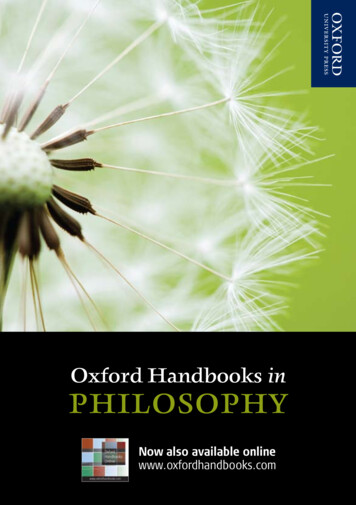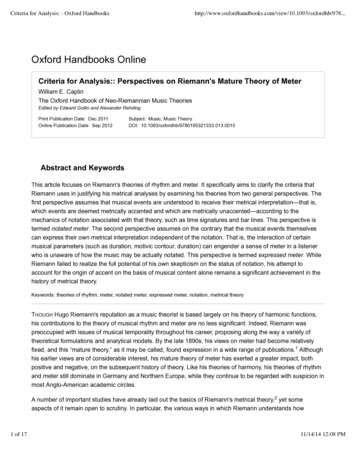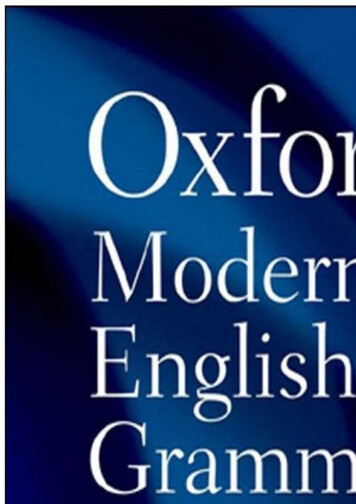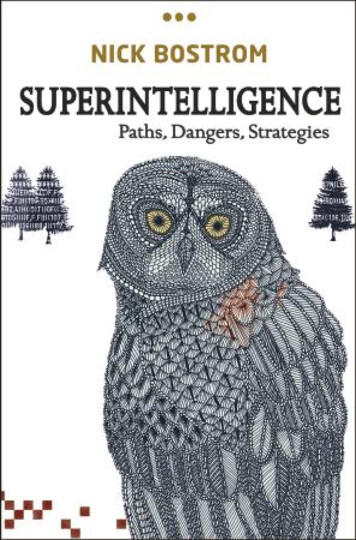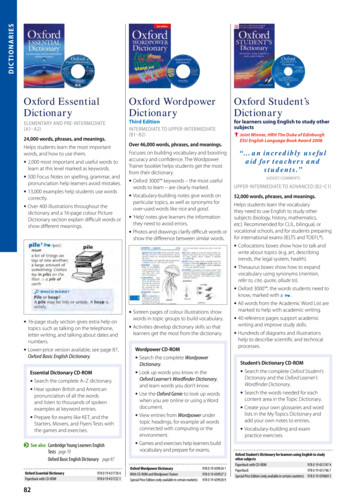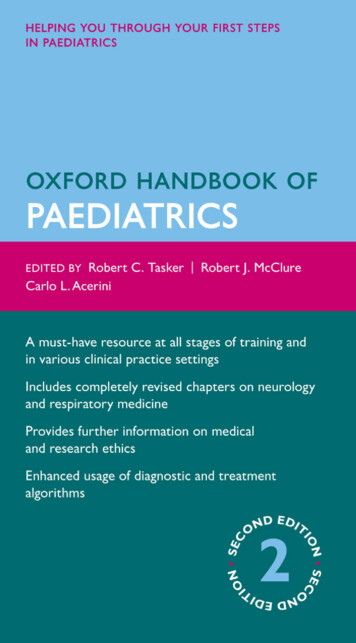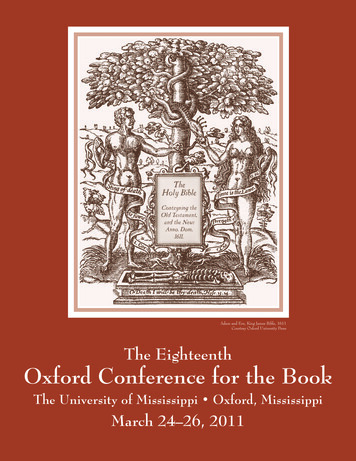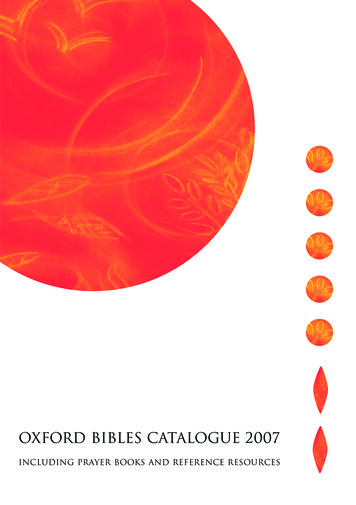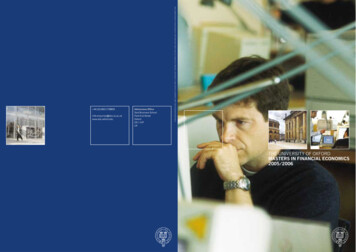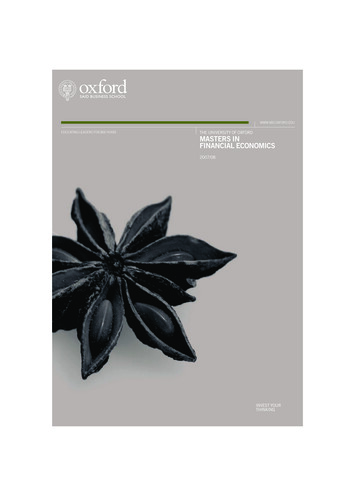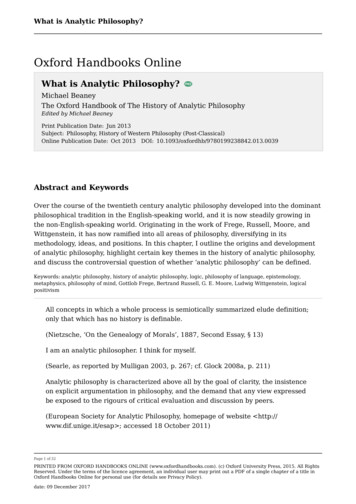
Transcription
What is Analytic Philosophy?Oxford Handbooks OnlineWhat is Analytic Philosophy?Michael BeaneyThe Oxford Handbook of The History of Analytic PhilosophyEdited by Michael BeaneyPrint Publication Date: Jun 2013Subject: Philosophy, History of Western Philosophy (Post-Classical)Online Publication Date: Oct 2013 DOI: 10.1093/oxfordhb/9780199238842.013.0039Abstract and KeywordsOver the course of the twentieth century analytic philosophy developed into the dominantphilosophical tradition in the English-speaking world, and it is now steadily growing inthe non-English-speaking world. Originating in the work of Frege, Russell, Moore, andWittgenstein, it has now ramified into all areas of philosophy, diversifying in itsmethodology, ideas, and positions. In this chapter, I outline the origins and developmentof analytic philosophy, highlight certain key themes in the history of analytic philosophy,and discuss the controversial question of whether ‘analytic philosophy’ can be defined.Keywords: analytic philosophy, history of analytic philosophy, logic, philosophy of language, epistemology,metaphysics, philosophy of mind, Gottlob Frege, Bertrand Russell, G. E. Moore, Ludwig Wittgenstein, logicalpositivismAll concepts in which a whole process is semiotically summarized elude definition;only that which has no history is definable.(Nietzsche, ‘On the Genealogy of Morals’, 1887, Second Essay, § 13)I am an analytic philosopher. I think for myself.(Searle, as reported by Mulligan 2003, p. 267; cf. Glock 2008a, p. 211)Analytic philosophy is characterized above all by the goal of clarity, the insistenceon explicit argumentation in philosophy, and the demand that any view expressedbe exposed to the rigours of critical evaluation and discussion by peers.(European Society for Analytic Philosophy, homepage of website http://www.dif.unige.it/esap ; accessed 18 October 2011)Page 1 of 32PRINTED FROM OXFORD HANDBOOKS ONLINE (www.oxfordhandbooks.com). (c) Oxford University Press, 2015. All RightsReserved. Under the terms of the licence agreement, an individual user may print out a PDF of a single chapter of a title inOxford Handbooks Online for personal use (for details see Privacy Policy).date: 09 December 2017
What is Analytic Philosophy?ANALYTICphilosophy is now generally seen as the dominant philosophical tradition in theEnglish-speaking world,1 and has been so from at least the middle of the last century.Over the last two decades its influence has also been steadily growing in the non-Englishspeaking world. One sign of this is the proliferation of societies for (p. 4) analyticphilosophy around the world.2 The growing dominance of the analytic tradition, however,does not mean that there has been any convergence of aims, methods, or views. Ifanything, the reverse is true: analytic philosophy now encompasses a far wider range ofapproaches, ideas, and positions than it ever did in its early days. From its originalconcern with epistemological and metaphysical questions in the philosophy of logic andmathematics (in the case of Frege and Russell) and in ethics and the theory of judgement(in the case of Moore), it has ramified—via the linguistic turn (taken first by Wittgenstein)—into all spheres of philosophy. As well as mainstream analytic philosophy in the areas ofphilosophy of language, logic, mathematics, mind and science, and analytic ethics, thereare also fields as diverse as analytic aesthetics, analytic Marxism, (p. 5) analyticalfeminism, analytic theism, and analytical Thomism, for example.3 There have also beencomplete reversals of views as well as diversification. One central strand in early analyticphilosophy was logical positivism, in which the repudiation of metaphysics wasfundamental. In the second half of the twentieth century, however, metaphysics hasundergone a revival, and while earlier analytic philosophers would have regarded‘analytic metaphysics’ as an oxymoron, the term now designates a respectablesubdiscipline.4 Analytic philosophy supposedly originated in reaction to Kantian andHegelian forms of idealism, yet analytic Kantianism has been alive and flourishing formany years and there is now talk of analytic philosophy being ushered from its Kantian toits Hegelian stage.5 Phenomenology has generally been seen as the main rival to theanalytic tradition in the first half of the twentieth century, yet analytic phenomenology,especially analytic phenomenology of mind, is both reputable and thriving in the twentyfirst century.6Faced with these developments, one might wonder whether it makes sense to talk of‘analytic philosophy’ any longer; as Frege once remarked, the wider the extension of a(p. 6) term, the less content it has (1884, § 29). Wanting to restrict the label to the earlyphase of the tradition, some have argued that analytic philosophy had exhausted itself bythe 1970s (at the latest), and that we are now in a ‘post-analytic’ age.7 These views,however, do not reflect the widespread use of ‘analytic philosophy’ to refer to muchcontemporary philosophy, and the term ‘early analytic philosophy’ has been introduced torefer to the early period.8 It seems best, then, to respect the current use of the term asmuch as possible and treat analytic philosophy as a tradition that is healthier andstronger today, albeit more diverse, than it has ever been in the past. Certainly, a concernwith the history of analytic philosophy should err on the side of inclusiveness. Even ifthere are some philosophers, schools of thought, or periods that some would wish toexclude from the tradition, their relationship to analytic philosophy, on whatevernarrower conception is favoured, will still be relevant in understanding the nature anddevelopment of analytic philosophy, so conceived.Page 2 of 32PRINTED FROM OXFORD HANDBOOKS ONLINE (www.oxfordhandbooks.com). (c) Oxford University Press, 2015. All RightsReserved. Under the terms of the licence agreement, an individual user may print out a PDF of a single chapter of a title inOxford Handbooks Online for personal use (for details see Privacy Policy).date: 09 December 2017
What is Analytic Philosophy?As a first approximation, then, in its most inclusive sense, analytic philosophy can becharacterized as the tradition that originated in the work of Gottlob Frege (1848–1925),Bertrand Russell (1872–1970), G. E. Moore (1873–1958), and Ludwig Wittgenstein (1889–1951) and developed and ramified into the complex movement (or set of interconnectedsubtraditions) that we know today. I say more about the origins of analytic philosophy inthe first section of this chapter, and more about its development in the second section. Inthe third section I discuss the question of what themes have been particularly importantin the history of analytic philosophy and hence might reveal something about thecharacter of the analytic tradition. These first three sections correspond (more or less) tothe three main parts of this Handbook. In the fourth and final section I draw on thesesections—and the Handbook as a whole—in directly addressing the question that formsthe title of this chapter. I shall leave until the next chapter consideration of the historicalturn that has taken place in analytic philosophy over the last two decades, the historiesthat have been written of the analytic tradition, and the questions that these raise as tothe relationship between (p. 7) analytic philosophy and history of philosophy.9 ThisHandbook is itself both an historical product of that historical turn and philosophicallyconceived to consolidate and deepen that historical turn.1.1 The Origins of Analytic PhilosophyRussell’s and Moore’s rebellion against British idealism has often been taken as signallingthe birth of analytic philosophy.10 Certainly, it is one of the key events in the emergence ofanalytic philosophy, and the nature of the rebellion is explained by Griffin in chapter 11 ofthis Handbook. For Russell, what was crucial was his concern with the foundations ofmathematics. After his initial flirtation with neo-Hegelianism, he came to the conclusionthat it was only by rejecting the neo-Hegelian doctrine of internal relations that anadequate account of mathematics could be provided. Relational propositions arefundamental in mathematics, and according to Russell, relations had to be treated as‘real’ (i.e. independent and irreducible) constituents of propositions in order formathematics to consist of truths. For Moore, what was crucial was his dissatisfaction withthe idealist’s denial of mind-independent objects. Moore came to believe that the world isquite literally composed of concepts, propositions being nothing other than complexconcepts. In understanding propositions, according to Moore, we grasp the constituentconcepts that the propositions are actually about. Both Russell and Moore, then, came toadopt a crude form of direct realism, and this was at the heart of their rebellion againstBritish idealism.In his own description of their rebellion in My Philosophical Development, Russell justtalked of their ‘new philosophy’,11 and nowhere in their early work does either Russell orMoore speak of ‘analytic’ or ‘analytical’ philosophy. (I trace the development of talk of‘analytic philosophy’, and the corresponding construction of analytic philosophy as atradition, in the next chapter.) What we do find, however, is emphasis on the role ofPage 3 of 32PRINTED FROM OXFORD HANDBOOKS ONLINE (www.oxfordhandbooks.com). (c) Oxford University Press, 2015. All RightsReserved. Under the terms of the licence agreement, an individual user may print out a PDF of a single chapter of a title inOxford Handbooks Online for personal use (for details see Privacy Policy).date: 09 December 2017
What is Analytic Philosophy?analysis. Russell’s first endorsement is in his book on Leibniz, where he asserts as an‘evident’ truth that ‘all sound philosophy should begin with an analysis ofpropositions’ (1900, p. 8). For Moore, such analysis consists in decomposing propositionsinto their constituent concepts, and this decompositional conception is also in play in thefirst chapter of Principia Ethica, where he argues that ‘good’ (p. 8) is indefinable, that is,that what ‘good’ denotes has no parts into which it can be decomposed.12As Griffin notes, we have a clear sense in which Russell’s and Moore’s ‘new philosophy’ is‘analytic’: at the core of their method is the decompositional analysis of propositions. ForMoore, this is conceptual analysis; Russell’s position, however, is more complex. WhileMoore and Russell agreed that the aim of philosophical analysis is to uncover thefundamental constituents of propositions,13 Russell understood this within a broaderprogramme of logical analysis. This involved the identification, first, of the logicalconstituents of propositions, that is, the logical constants,14 but second, more importantly,of the logical propositions themselves, and in particular, of the fundamental propositionsor logical principles from which all other logical propositions can be derived. It is thisidea that lay at the core of his work on the foundations of mathematics from 1901, whenhis logicist project was first announced—the project of showing how the propositions ofmathematics can be derived from purely logical propositions.15What made logicism feasible was the creation of modern logic, the system ofpropositional and predicate logic whose use has been a major force in the development ofanalytic philosophy. It is here that Frege comes into the story and obliges us toacknowledge him as one of the co-founders of analytic philosophy. For it was Frege whocreated quantificational logic, and although Russell learnt of this logic through GiuseppePeano (1858–1932), and adapted Peano’s notation rather than Frege’s, there is no doubtthat once Russell properly studied Frege’s writings, after completing The Principles ofMathematics in May 1902, he both learnt from them and developed his own position incritique of some of Frege’s key ideas.16 Frege was also an influence on Wittgenstein,whose early thinking was prompted by the problems he found in Frege’s and Russell’swork, taking over some of their ideas and assumptions but criticizing others. So on (p. 9)this score, too, Frege must be counted as one of the co-founders of analytic philosophy.Moore’s and Russell’s rebellion against British idealism occurred independently of Frege,but both Russell’s subsequent work and Wittgenstein’s thinking were inextricably linkedto Frege’s ideas.17Quantificational logic was first presented in Frege’s Begriffsschrift of 1879, where heannounces that his ultimate aim is to give a logical analysis of number (1879, p. viii). Overtwenty years before Russell, then, Frege set out to demonstrate that arithmetic isreducible to logic. (Unlike Russell, Frege was never a logicist about geometry.) He gavehis first, informal account in Die Grundlagen der Arithmetik of 1884, and the formal proofwas his aim in Grundgesetze der Arithmetik, of which Volume I appeared in 1893 andVolume II in 1903. It was while the second volume was in press that Russell informedhim, in June 1902, of the contradiction that undermined his system, and Frege was soonled to abandon his logicist project. The task of demonstrating logicism was passed on toPage 4 of 32PRINTED FROM OXFORD HANDBOOKS ONLINE (www.oxfordhandbooks.com). (c) Oxford University Press, 2015. All RightsReserved. Under the terms of the licence agreement, an individual user may print out a PDF of a single chapter of a title inOxford Handbooks Online for personal use (for details see Privacy Policy).date: 09 December 2017
What is Analytic Philosophy?Russell, who found it necessary to construct a complex theory of types to avoid thecontradiction (and related ones). In pursuing his logicist project, however, Frege hadbeen led to develop many of the ideas that became influential in subsequent analyticphilosophy. Many courses in the philosophy of language today, for example, begin withFrege’s key distinctions between concept and object, and Sinn and Bedeutung; and theinternalism/externalism debate in current philosophy of mind goes back to Frege’s theoryof thought and his views about indexicality. An account of Frege’s influence is provided byTyler Burge in chapter 10 of this Handbook (see also Burge 1992).Frege’s creation of quantificational logic and the rebellion by Russell and Moore againstBritish idealism are the two most significant events in the emergence of analyticphilosophy, events that lie at the root of many of the ideas and achievements that weassociate with early analytic philosophy, such as Frege’s logical analysis of existential andnumber statements, Moore’s critique of naturalism, Russell’s theory of descriptions andtheory of types, and Wittgenstein’s conception of logical propositions as tautologies. Adeeper understanding of the origins of analytic philosophy, then, requires appreciation ofthe background to these events—in particular, the German philosophical and scientificbackground to Frege’s and Wittgenstein’s work, the British philosophical background toRussell’s and Moore’s rebellion, and the mathematical and logical background to Frege’sand Russell’s logicist projects. The chapters by David Hyder, Gottfried Gabriel, JohnSkorupski, and Jamie Tappenden offer an account of these backgrounds. I also say moreabout this in the first section of the next chapter, and further details are provided in thechronology that forms chapter 3. Here I simply note that to place a philosopher’s work inhistorical context is not necessarily to dissolve away its originality or significance: it mayhelp, instead, to identify just what was new and important.Originality and significance, however, are often only appreciated with hindsight.Frege’s work was recognized by very few at the time. Russell claimed that it was he whofirst drew attention to Frege. The claim is false, but he is right that he wrote the firstexposition of Frege’s philosophy in English, and it was through this exposition thatWittgenstein learnt of Frege’s work.18 Frege’s influence on Russell and (to a muchgreater extent) Wittgenstein, however, was not appreciated until after the Second WorldWar, and Frege’s work was overlooked in the early histories of analytic philosophy (seethe next chapter). Even today, he is still sometimes omitted,19 but the general consensusfirmly locates him at the heart of analytic philosophy.(p. 10)In recent years there has been growing interest in the work of Bernard Bolzano (1781–1848). Bolzano was critical of Kant’s account of mathematics, just as Frege and Russellwere, and his conceptions of analyticity, apriority, logical consequence, andpropositionality, as well as his use of the method of variation, anticipate the ideas of lateranalytic philosophers. Bolzano did not directly influence the four acknowledged mainfounders of analytic philosophy, but he did influence Kazimierz Twardowski (1866–1938),the founder of the Lvov–Warsaw School, whose work fed into the later analytic traditionthrough Alexius Meinong (1853–1920) and Alfred Tarski (1902–83), among others.Recognizing the Polish and Austrian influences on analytic philosophy—or better, thePage 5 of 32PRINTED FROM OXFORD HANDBOOKS ONLINE (www.oxfordhandbooks.com). (c) Oxford University Press, 2015. All RightsReserved. Under the terms of the licence agreement, an individual user may print out a PDF of a single chapter of a title inOxford Handbooks Online for personal use (for details see Privacy Policy).date: 09 December 2017
What is Analytic Philosophy?Polish and Austrian branches of analytic philosophy, then, brings Bolzano into its familytree, as a granduncle of the analytic tradition.20 Whether or not we agree to countBolzano himself as an analytic philosopher, however, consideration of his work certainlyhas a place in understanding the history of analytic philosophy. Mark Textor explainsBolzano’s critique of Kant in chapter 5 of this Handbook.If there is anything that might provide a defining characteristic of ‘analytic’ philosophy,then the obvious candidate—as the very name suggests—is the role played by analysis. Asindicated above, Russell’s and Moore’s early philosophy was indeed ‘analytic’ in the sensethat the decompositional analysis of propositions was central to their methodology. AsRussell himself announced in 1900, ‘That all sound philosophy should begin with ananalysis of propositions, is a truth too evident, perhaps, to demand a proof’ (1900, p. 8).This remark is made in his book on Leibniz, and he immediately went on to note: ‘ThatLeibniz’s philosophy began with such an analysis, is less evident, but seems (p. 11) to beno less true’ (ibid.). Russell’s first remark is frequently cited; the implication of thesecond is less often recognized: that Leibniz might count as an analytic philosopher justlike Russell. But if Leibniz so counts, then how far back can we go? To Descartes? ToOckham, Buridan, and other medieval logicians? To Aristotle or even Plato? As RichardGaskin shows in chapter 29, there are logical atomist themes in Plato’s Theaetetus, asRyle and others have explored.In fact, the decompositional conception of analysis that Moore and Russell adopted wasneither new nor definitively characteristic of later analytic philosophy, even in the case ofRussell’s and Moore’s own later philosophy. Arguably, Moore inherited his earlyconception from Brentano via Stout and Ward,21 and Moore in turn influenced Russell,reinforced by Russell’s own work on Leibniz in 1899.22 Moore’s and Russell’s earlyconception of analysis was extremely crude, reflecting as it did their initial naïve realism,but richer and more interesting conceptions soon developed. By far the most significantand influential conception was that embodied in Russell’s theory of descriptions, first putforward in 1905 and famously described by Ramsey as a ‘paradigm of philosophy’ (1931b,p. 263). Much has been written about this;23 what is important for present purposes is therole played by what I have called ‘interpretive’ or ‘transformative’ analysis.24 The firststep in the analysis of a sentence of the (grammatical) form ‘The F is G’ consists ininterpreting it as, or transforming it into, a sentence of a different (quantificational) form,namely, ‘There is one and only one F, and whatever is F is G’, taken to represent the reallogical form of the proposition expressed by the sentence—or at least, as a step nearerthe goal of complete representation. (For discussion of the idea of a logically perfectlanguage involved in this, see Hylton’s chapter.)Russell’s theory of descriptions opened up the prospect of a whole new philosophicalprogramme: making clear the ‘real’ logical form of propositions to both reveal thefundamental structure and composition of the world and resolve philosophical perplexitythat arises from misunderstanding the logic of our language and thought. Developing theassociated ideas of ‘incomplete symbols’ and ‘logical fictions’, Russell applied the theoryPage 6 of 32PRINTED FROM OXFORD HANDBOOKS ONLINE (www.oxfordhandbooks.com). (c) Oxford University Press, 2015. All RightsReserved. Under the terms of the licence agreement, an individual user may print out a PDF of a single chapter of a title inOxford Handbooks Online for personal use (for details see Privacy Policy).date: 09 December 2017
What is Analytic Philosophy?in attempting to solve the paradoxes that threatened his logicist project, and then turnedto what he later called ‘logical constructions’ in other areas of philosophy, as BernardLinsky explains in chapter 12.25There was development in Moore’s views on analysis, too, as Thomas Baldwin shows inchapter 13. Moore’s early (crude) decompositional conception of analysis underlies bothhis attack in Principia Ethica (1903a) on the supposed naturalistic fallacy and his ideathat philosophical disagreements arise from failing to disentangle questions that getfused together (1903a, p. vii). After that, Moore’s views become more complex. Moore(p. 12) (1944) endorsed Ramsey’s praise of Russell’s theory of descriptions, for example,but he did not advocate any systematic project of analysis such as Russell did. Influenced,too, by Wittgenstein’s Tractatus (1921), Moore insisted that one could understand themeaning of an expression without being able to give a correct analysis of its meaning.This enabled him to claim, in ‘A Defence of Common Sense’ (1925), that one could knowthat certain deliverances of common sense are true even if one has no analysis of therelevant statements to hand. The idea also underlies Moore’s ‘Proof of an ExternalWorld’ (1939), as Annalisa Coliva makes clear in section 34.1 of chapter 34 (and see alsosection 35.3 of Juliet Floyd’s chapter).Russell’s, Moore’s, and Wittgenstein’s ideas all helped form what became known as theCambridge School of Analysis, which reached the peak of its influence in the 1930s, asBaldwin describes in the second half of his chapter. As well as Russell, Moore, andWittgenstein, key figures in Cambridge were C. D. Broad (1887–1971), Frank Ramsey(1903–30), and John Wisdom (1904–93), and in London (though Cambridge educated)Susan Stebbing (1885–1943). The journal Analysis was founded in 1933, and in the pagesof both it and the Proceedings of the Aristotelian Society there was both lively discussionof the nature of analysis and examples of its use that also generated debate. It was withrespect to the Cambridge School that the term ‘analytic philosophy’ was first used, and Isay much more about this and the construction of the analytic tradition in the followingchapter.Wittgenstein’s Tractatus was the single most important influence on the CambridgeSchool, and it is generally regarded as the key text of early analytic philosophy,influencing every subsequent generation of analytic philosophers. In the final chapter ofPart I of this Handbook, Michael Kremer offers an account of its main ideas by focusingon the summary of the whole sense of the book that Wittgenstein himself offered in hispreface: ‘what can be said at all can be said clearly; and whereof one cannot speakthereof one must be silent’ (1922, p. 27). At the end of his book, Wittgenstein notoriouslyclaimed that the propositions of the Tractatus were nonsensical, to be kicked away onceone has used them as a ladder to climb up to the correct view. Traditionally,commentators have interpreted Wittgenstein as holding that the nonsense is nevertheless‘illuminating’, intended to express ineffable truths about language, logic, and the world.26In recent years, however, a new ‘therapeutic’ or ‘resolute’ reading has been developedthat challenges this traditional view; and this has stirred a great deal of debate.According to the new reading, we should take Wittgenstein at his word and not ‘chickenPage 7 of 32PRINTED FROM OXFORD HANDBOOKS ONLINE (www.oxfordhandbooks.com). (c) Oxford University Press, 2015. All RightsReserved. Under the terms of the licence agreement, an individual user may print out a PDF of a single chapter of a title inOxford Handbooks Online for personal use (for details see Privacy Policy).date: 09 December 2017
What is Analytic Philosophy?out’ by talking of illuminating nonsense and ineffable truths.27 Kremer sides more withthe new than the old reading, and uses his discussion to elucidate Wittgenstein’s famousremark (in a letter to Ficker in 1919) that the point of his book was in fact ethical.Page 8 of 32PRINTED FROM OXFORD HANDBOOKS ONLINE (www.oxfordhandbooks.com). (c) Oxford University Press, 2015. All RightsReserved. Under the terms of the licence agreement, an individual user may print out a PDF of a single chapter of a title inOxford Handbooks Online for personal use (for details see Privacy Policy).date: 09 December 2017
What is Analytic Philosophy?1.2 The Development of AnalyticPhilosophy(p. 13)Wittgenstein’s Tractatus can be regarded as marking the culmination of the early periodof analytic philosophy. Wittgenstein’s own statement in his preface that he is ‘indebted toFrege’s great works and to the writings of my friend Mr Bertrand Russell’ (1922, p. 3)reinforces the case for regarding Frege as one of the founders of the analytic tradition,and for classifying Frege’s invention of quantificational logic alongside Moore’s andRussell’s rebellion against British idealism as the two most significant events in theemergence of analytic philosophy. Its further development is characterized by its gradualbroadening and ramifying, as the ideas of Frege, Russell, Moore, and Wittgenstein in itsearly period were applied, criticized, extended, and transformed. Russell, Moore, andWittgenstein themselves played major roles in this development. An account of Russell’sproject in The Analysis of Matter of 1927 is included in Linsky’s chapter, and Moore’s‘Proof of an External World’ of 1939 is examined by Annalisa Coliva in chapter 34. BothRussell’s and Moore’s views on perception and sense-data are also discussed by GaryHatfield in chapter 33. Hans-Johann Glock provides a survey of Wittgenstein’s laterphilosophy in chapter 18, concluding by addressing the disputed questions of his legacyand of whether the later Wittgenstein is an ‘analytic’ philosopher.In the development of analytic philosophy in its second phase, Russell, Moore, andWittgenstein were joined by a broad range of philosophers of the next generation, who,with different backgrounds and interests, introduced new approaches and ideas inresponding not only to earlier philosophical views but also to subsequent advances inlogic, mathematics, science, and other disciplines. The work of the Cambridge School ofAnalysis in the 1920s and 1930s has already been mentioned. Standard stories of analyticphilosophy in Britain simply then switch, after the Second World War, to Oxford and socalled ordinary language philosophy, with Gilbert Ryle (1900–76), J. L. Austin (1911–60),and P. F. Strawson (1919–2006) taking over as the dominant figures.28 In fact, however,there was an earlier movement in Oxford that in some ways parallels developments inCambridge. Indeed, in its own rejection of British idealism, it begins several years beforeMoore’s and Russell’s rebellion, and defends anti-psychologistic and realist views ofknowledge and perception that are interestingly related to Moore’s and Russell’s.Certainly, they were all part of the vigorous epistemological debate that took place inBritain in the first half of the twentieth century—and continues to the present day. Thekey figures were John Cook Wilson (1848–1915) and H. A. Prichard (1871–1947), and(p. 14) Part II of this Handbook opens with an account of Oxford realism by CharlesTravis and Mark Kalderon. As they argue, the work of later Oxford philosophers,especially Austin and, more recently, John McDowell (1942–), must be seen in the broaderhistorical context of the Oxford tradition. I say more about Oxford realism in section 2.3of the next chapter, and there is further discussion in Hatfield’s chapter.Page 9 of 32PRINTED FROM OXFORD HANDBOOKS ONLINE (www.oxfordhandbooks.com). (c) Oxford University Press, 2015. All RightsReserved. Under the terms of the licence agreement, an individual user may print out a PDF of a single chapter of a title inOxford Handbooks Online for personal use (for details see Privacy Policy).date: 09 December 2017
What is Analytic Philosophy?The most important event in the development of analytic philosophy in its second phase,though, was the establishment of the Vienna Circle, following on from the founding of theVerein Ernst Mach in 1928 and with its collaborative name-bestowing manifesto launchedin 1929 (Carnap, Hahn, and Neurath 1929). The movement of logical positivism—orlogical empiricism (the two terms are often used synonymously)—proved to be far moreinfluential than the Cambridge School of Analysis. Indeed, while both were seen as formsof analytic philosophy in the 1930s (see the n
The Oxford Handbook of The History of Analytic Philosophy Edited by Michael Beaney Print Publication Date: Jun 2013 Subject: Philosophy, History of Western Philosophy (Post-Classical) . philosophy of language, logic, mathematics, mind and science, and analytic ethics, there are also fields as diverse as analytic aesthetics, analytic Marxism .
